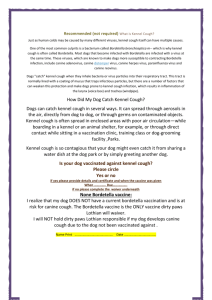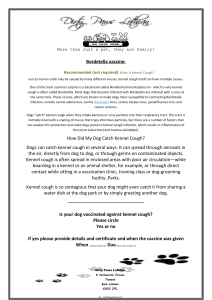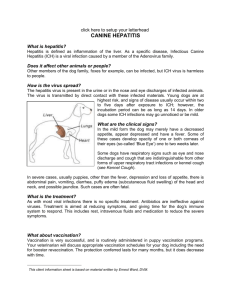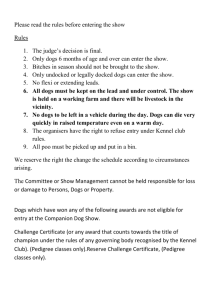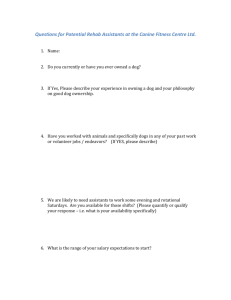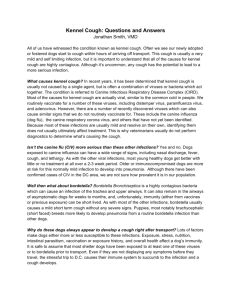Kennel Cough
advertisement
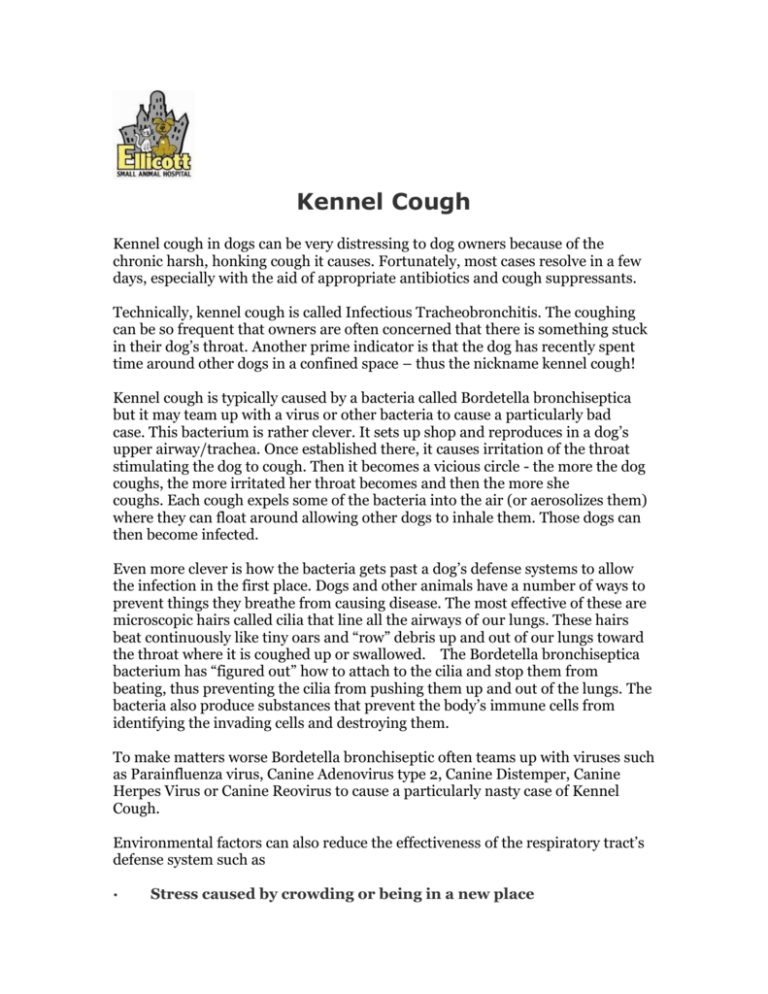
Kennel Cough Kennel cough in dogs can be very distressing to dog owners because of the chronic harsh, honking cough it causes. Fortunately, most cases resolve in a few days, especially with the aid of appropriate antibiotics and cough suppressants. Technically, kennel cough is called Infectious Tracheobronchitis. The coughing can be so frequent that owners are often concerned that there is something stuck in their dog’s throat. Another prime indicator is that the dog has recently spent time around other dogs in a confined space – thus the nickname kennel cough! Kennel cough is typically caused by a bacteria called Bordetella bronchiseptica but it may team up with a virus or other bacteria to cause a particularly bad case. This bacterium is rather clever. It sets up shop and reproduces in a dog’s upper airway/trachea. Once established there, it causes irritation of the throat stimulating the dog to cough. Then it becomes a vicious circle - the more the dog coughs, the more irritated her throat becomes and then the more she coughs. Each cough expels some of the bacteria into the air (or aerosolizes them) where they can float around allowing other dogs to inhale them. Those dogs can then become infected. Even more clever is how the bacteria gets past a dog’s defense systems to allow the infection in the first place. Dogs and other animals have a number of ways to prevent things they breathe from causing disease. The most effective of these are microscopic hairs called cilia that line all the airways of our lungs. These hairs beat continuously like tiny oars and “row” debris up and out of our lungs toward the throat where it is coughed up or swallowed. The Bordetella bronchiseptica bacterium has “figured out” how to attach to the cilia and stop them from beating, thus preventing the cilia from pushing them up and out of the lungs. The bacteria also produce substances that prevent the body’s immune cells from identifying the invading cells and destroying them. To make matters worse Bordetella bronchiseptic often teams up with viruses such as Parainfluenza virus, Canine Adenovirus type 2, Canine Distemper, Canine Herpes Virus or Canine Reovirus to cause a particularly nasty case of Kennel Cough. Environmental factors can also reduce the effectiveness of the respiratory tract’s defense system such as · Stress caused by crowding or being in a new place · · · · Poor ventilation Heavy dust in the air Cigarette smoke Cold temperatures If you suspect kennel cough, take your dog to your Veterinarian. Often the diagnosis is made based on travel history and the physical exam alone. In severe cases, an x-ray of the lungs may be needed. While cases can resolve on their own, most dogs are helped with antibiotics and a cough suppressant. By reducing the coughing, the throat has a chance to heal and repair its own defense systems. It is important to know that this disease is highly contagious to other dogs and even to rabbits, pigs and guinea pigs. Cats can be infected but only when very young and typically in crowded conditions. Keep an infected dog away from other dogs and minimize the time in your veterinarian’s waiting area. The most common places for dog to pick up kennel cough is boarding kennels, vaccination clinics, dog classes, dog shows, animal shelters, and less often grooming parlors or even your vet’s office. Dogs usually show signs of coughing 2-14 days from exposure to an infected dog. Vaccinations/Prevention Vaccinations are available at your veterinarian to reduce the chance of your dog contracting the disease. If you plan to expose your dog to any of the above situations, annual vaccinations or for dogs with increased exposure twice a year booster is recommended. If your kennel or groomer does not require kennel cough vaccinations you should be concerned that other dogs visiting that facility may be more likely to have kennel cough. Make sure you get your dog vaccinated at least 5 days before you plan to kennel your dog. The vaccination cannot guarantee 100% protection but it helps.
